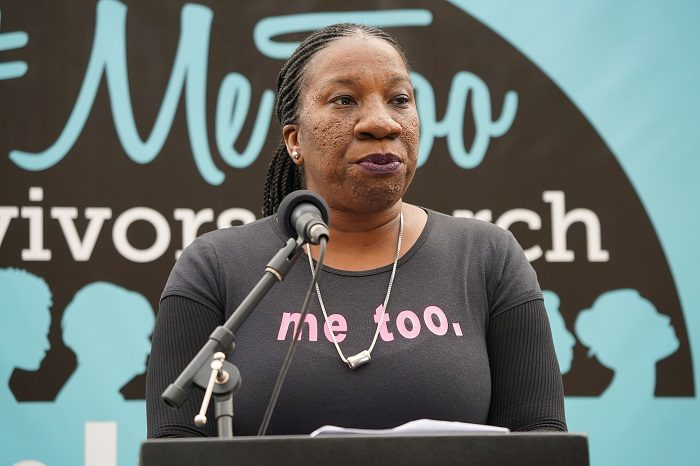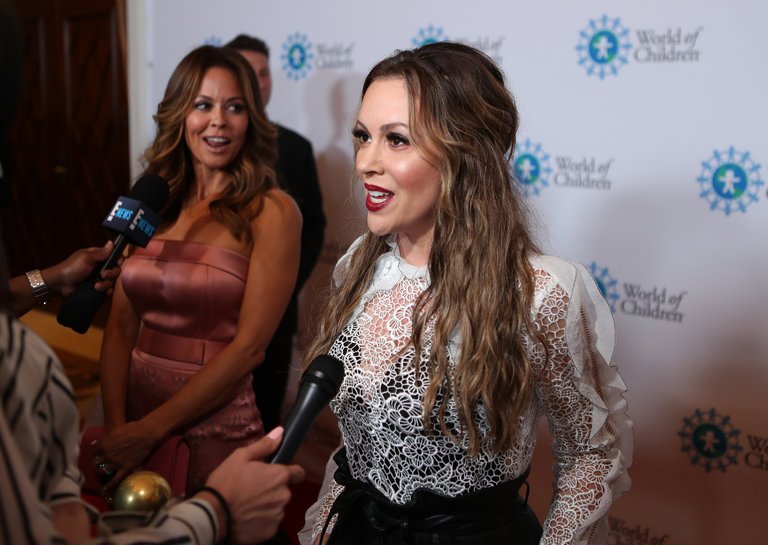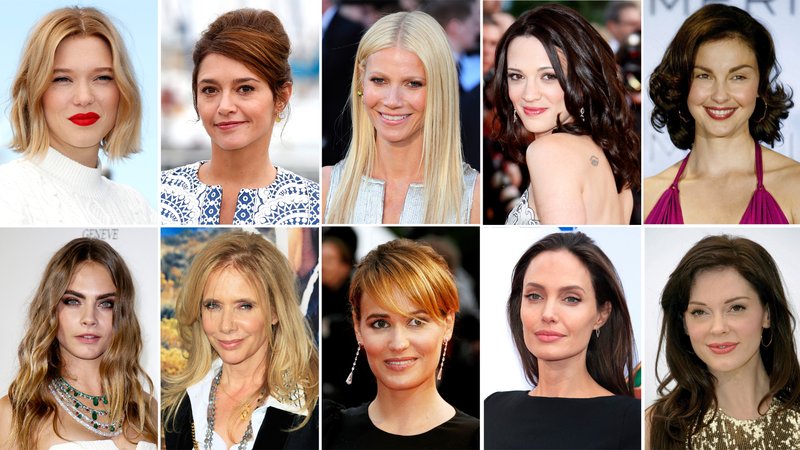www.aljazeerah.info
News, December 2017
Archives
Mission & Name
Conflict Terminology
Editorials
Gaza Holocaust
Gulf War
Isdood
Islam
News
News Photos
Opinion Editorials
US Foreign Policy (Dr. El-Najjar's Articles)
www.aljazeerah.info
|
Editorial Note: The following news reports are summaries from original sources. They may also include corrections of Arabic names and political terminology. Comments are in parentheses. |
Stars of the Year 2017:
Tarana Burke and Alyssa Milano
Symbols off the #Me Too Movement
December 14, 2017
Editor's Note:
Choosing the "Star of the Year 2017," whose deeds have served the cause of human dignity and prosperity, was a very difficult job in comparison with the previous years, until the #Me Too movement was clear in October.
In 2014, it was easy to identify Gaza children celebrating their survival after the war, as the "Stars of the Year 2014." Likewise, it was even easier to identify Angela Merkel as the "Star of the Year 2015" for admitting more than one million Syrian refugees to Germany. In 2016, the Swedish Foreign Minister, Margot Wallstrom" deserved to be identified as the "Star of Year 2016" for her courageous stance with the Palestinian people.
This year, the "Stars of the Year 2017" are the hundreds of courageous women, who came out, part of the "#Me Too" movement, in protest against their sexual harassers, in the US and around the world.
Representing these victims of sexual harassment are two women, who became the symbols of the "#Me Too" movement. The first is Tarana Burke, who started the "Me Too" nonprofit organization in 2007, to help victims of sexual harassment and sexual assault. The second is the actress Alyssa Milano, who created the hash tag "#Me Too" in October 2017, urging women to acknowledge their experiences of sexual harassment and sexual assault publicly. Their efforts encouraged many women to come out, sharing their experiences, and consequently leading to law suits against their harassers, and to more awareness about this pervasive social problem.
As symbols of the "#Me Too" movement, Tarana Burke and Alyssa Milano deserve to be identified as the "Stars of the Year 2017."
 |
 |
| Tarana Burke, who in 2007 created the "Me Too" nonprofit organization, to help victims of sexual harassment and assault (Photo taken in November 2017). | Alyssa Milano, who created hash tag "Me Too" in October 2017, urging women to acknowledge their experiences of sexual harassment publicly. |
 |
|
| Some of Harvey Weinstein's
sexual harassment women victims, who came out with their
accusations, thus encouraging more "Me Too" victims to speak out. |
More photos of women who came out as "Me Too" victims of sexual harassment:
https://www.google.com/search?q=photos+of+women+who+came+out+as+me+too&tbm
***
Since Weinstein, here’s a growing list of men accused of sexual misconduct
An incomplete, depressingly long list of celebrities’ sexual assault and harassment stories
https://www.avclub.com/an-incomplete-depressingly-long-list-of-celebrities-se-1819628519
A Running List Of The Women Who’ve Accused Donald Trump Of Sexual Misconduct
https://www.huffingtonpost.com/entry/a-running-list-of-the-women-whove-accused-donald-trump-of-sexual-misconduct_us_57ffae1fe4b0162c043a7212
All the women who have accused Harvey Weinstein of sexual harassment and assault, so far
***
Tarana Burke was omitted from the TIME Magazine cover, so let’s celebrate the sh*t out of her today!
By Hari Ziyad
Afro Punk, December 7, 2017
A Black woman creates something, and white people credit themselves for it, after ignoring it for as long as possible. Where have we heard this before?
The latest unsurprising example of appropriating Black labor is in the case of TIME Magazine, which recently chose “The Silence Breakers” of the #MeToo movement as their 2017 person of the year.
As you are probably well aware, the #MeToo movement took over national consciousness when it went viral amidst dozens of women coming forward accusing media mogul Harvey Weinstein of sexual harassment and other violence. Since then, accusations against at least 74 public figures have come to light, leading to the firing of Weinstein and others, including House of Cards actor Kevin Spacey.
As with most good things, a Black woman named Tarana Burke was the original creator of the #MeToo awareness movement, but you would never know that from whom TIME chose to put on its cover instead.
Instead, among whom it deemed to be the “voices that launched a movement,” the magazine only included actress Ashley Judd, singer Taylor Swift, corporate lobbyist Adama Iwu, worker Isabel Pascual and former Uber engineer Susan Fowler. Though Burke was included within the magazine’s story, her omission from the cover had some people in an uproar:
But we ain’t mad. We expect this from white supremacy, and are past trying to put some lipstick on that pig by begging them to pretend like they like us.
Instead, we will celebrate Burke ourselves.
Two months ago, the 44-year-old activist told Ebony she began Me Too in 2006 as a grassroots movement to aid sexual assault survivors in underprivileged communities “where rape crisis centers and sexual assault workers weren’t going.”
“It wasn’t built to be a viral campaign or a hashtag that is here today and forgotten tomorrow,” she explained. “It was a catchphrase to be used from survivor to survivor to let folks know that they were not alone and that a movement for radical healing was happening and possible.”
Based on the motto “empowerment through empathy,” Burke’s vision for the movement was ultimately to ensure survivors on the margins know they’re not alone in their journey.
“What’s happening now is powerful and I salute it and the women who have disclosed but the power of using ‘me too’ has always been in the fact that it can be a conversation starter or the whole conversation – but it was us talking to us,” Burke told Ebony.
Whether white-ran magazines recognize her or not, Burke’s work speaks volumes, and we salute her. Here’s to working to ensure our support is enough, because, oftentimes, that’s all we have.
You can learn more about Burke’s #MeToo movement here!
http://afropunk.com/2017/12/tarana-burke-omitted-time-magazine-cover-lets-celebrate-sht-today/
***
How Harvey Weinstein’s first accusers paved the way for more
Accusations can set off a domino effect. But why don’t we treat the first accuser with the same respect as the 20th?
By Anna North,
Vox, Oct 12, 2017
Ashley Judd at the Women’s March on Washington on January 21, 2017. Photo by Theo Wargo/Getty Images
Katherine Kendall was 23 when producer Harvey Weinstein convinced her to come to his apartment, she told the New York Times. Once there, she recalled, he stripped naked, stood between her and the door, and asked her to show him her breasts.
When he finally let her leave, she told Michael Barbaro of the Daily podcast on Wednesday, he went so far as to get into a cab with her, then wait for 20 minutes watching her after she got out. But she didn’t report his actions publicly at the time.
“I think that when people perpetrate against you, you are the one that feels the shame,” she said. “You think that it’s just you.”
Kendall is now one of many women with strikingly similar allegations against Weinstein. Their statements in recent days have followed a pattern common in cases of alleged sexual assault or harassment by powerful men: Once enough women have spoken publicly, they set off a domino effect, in which many more women feel safe enough to come forward. Unfortunately, this often happens years or even decades after the first alleged incidents took place. The stories now pouring out about Weinstein, then, raise some questions: Why do dozens of people have to accuse a powerful man before he faces consequences? And why don’t we treat the first accuser with the same respect as the 20th?
In the past week, articles at the New York Times and the New Yorker have told the stories of women who say Weinstein harassed or assaulted them. The initial wave included Ashley Judd, Asia Argento, Mira Sorvino, Rosanna Arquette, and several others. Since these stories were published, even more women have spoken out, including Cara Delevingne, Romola Garai, and Léa Seydoux. A list at Vox includes, as of this writing, more than 25 women who have accused Weinstein of harassment or assault. The allegations have also inspired at least one woman to speak out about another man in Hollywood: On Tuesday, Hilarie Burton said Ben Affleck had groped her in 2003, when she was 21. Affleck has apologized.
We’ve seen this kind of outpouring before. Allegations of sexual assault against Bill Cosby had been public and mostly ignored since 2005, but after Hannibal Buress mentioned them in a comedy routine in 2014, even more women began to come forward. In 2015, 35 of Cosby’s accusers appeared on the cover of New York magazine. By 2016, there were at least 58 accusers, their allegations going back to the 1960s.
A similar thing happened with Roger Ailes, the former CEO of Fox News. After Gretchen Carlson sued him for sexual harassment in 2016, a number of other women came forward with similar allegations. “If one person breaks her silence and comes forward,” Emily Crockett wrote at Vox at the time, “it can open the floodgates and embolden other victims to add their stories as testimony.” She also noted that the many women speaking out about Cosby may have influenced others come forward to accuse Ailes. And it’s possible that the many women who spoke up in both of those cases helped pave the way for those who are now speaking out about Weinstein.
Sadly, it’s easy to see why so many women stay silent for so long. Most people who are assaulted never report the crime — estimates of the share of assaults reported to law enforcement range from 5 to 20 percent, according to the Washington Post. In Weinstein’s case, many women were afraid of retaliation, according to Ronan Farrow in the New Yorker. In fact, many said they believed their careers had been damaged because they said no to Weinstein or complained about his behavior. In cases where accusers reached a settlement with Weinstein, they may be bound by nondisclosure agreements. Others who keep silent may fear the public humiliation and harassment that women who accuse powerful men so often have to endure.
Some women, meanwhile, may fear that what was a traumatic event for them will just be brushed off by others. “I wasn’t sure if people would care,” Kendall told The Daily of her alleged abuse by Weinstein. After all, she said, Weinstein had never actually touched her. “If I’m not bleeding,” she asked, “then does it really matter?”
All of these stories are a reminder that too often, it may not be safe for one person to speak up about harassment or assault. It’s too easy for her to be smeared, silenced, belittled, or disbelieved. Instead, powerful men can operate with impunity for decades, until their victims are simply too numerous to ignore.
Changing that will require creating networks, formal and informal, to help women report their experiences and get help. It also means protecting and supporting women who choose to speak publicly. Due in part to the approach of Betsy DeVos and the Department of Education on the issue of campus sexual assault, there’s a public perception that supporting survivors of abuse and assault means suspending due process for the accused. But we don’t need to summarily throw men in handcuffs in order to do much better than we’re doing now. What we need to do is listen, and investigate, and care, rather than subjecting those who say they’ve been abused to even more abuse.
In her interview with The Daily, Kendall described the solidarity she now feels with all the other women who have come forward to tell stories like hers. “I already feel like I’m silently holding hands with the other women that have been through this,” she said, “and there’s a great power in that.”
Anyone who comes forward about sexual assault should feel this kind of support from others. And it shouldn’t be silent.
https://www.vox.com/identities/2017/10/12/16459000/harvey-weinsteins-assault-accusers
***
The Woman Who Created #MeToo Long Before Hashtags -
By SANDRA E. GARCIA
The New York Times, OCT. 20, 2017
In 1997, Tarana Burke sat across from a 13-year-old girl who had been sexually abused. The young girl was explaining her experience, and it left Ms. Burke speechless. That moment is where the Me Too campaign was born.
“I didn’t have a response or a way to help her in that moment, and I couldn’t even say ‘me too,’ ” Ms. Burke said.
“It really bothered me, and it sat in my spirit for a long time,” she added.
Ten years after that conversation, Ms. Burke created Just Be Inc., a nonprofit organization that helps victims of sexual harassment and assault. She sought out the resources that she had not found readily available to her 10 years before and committed herself to being there for people who had been abused.
And she gave her movement a name: Me Too.
On Sunday, those two words burst into the spotlight of social media with #metoo, a hashtag promoted by the actress Alyssa Milano. Amid the firestorm that ignited, some women of color noted pointedly that the longtime effort by Ms. Burke, who is black, had not received support over the years from prominent white feminists.
Ms. Milano was seeking to give a voice to sexual abuse victims, after accusations of sexual harassment and assault were leveled against the Hollywood producer Harvey Weinstein.
After her tweet, social media was soon flooded with stories of harassment and assault, as #metoo became a way for users to tell their experience with sexual violence and stand in solidarity with other survivors. The hashtag was widely used on Twitter, Facebook, Snapchat and other platforms; on Facebook, it was shared in more than 12 million posts and reactions in the first 24 hours, according to The Associated Press.
It was a particularly combustible moment for social media activism. Days earlier, amid the allegations against Mr. Weinstein, the actress Rose McGowan, who is among those accusing him of sexual harassment, was briefly locked out from her Twitter account, where she had been vocally speaking out against sexual harassment in Hollywood.
The following day, women online participated in a daylong boycott of Twitter, organized around the hashtag #WomenBoycottTwitter. Ms. Milano joined the boycott.
But black, Latino and other women of color started their own campaign. April Reign, a digital media strategist and the woman behind the #OscarSoWhite hashtag, began to organize people around the #WOCAffirmation or women of color affirmation.
The purpose was to uplift one another as they saw a disparity in how women of color were treated when they reported abuse.
“White women have not been as supportive as they could have been of women of color when they experience targeted abuse and harassment,” Ms. Reign said in an interview.
“We saw that with Jemele Hill,” she said, referring to the sports journalist who was suspended by ESPN this month for speaking out against the N.F.L., “and Leslie Jones,” the comedian who was harassed on Twitter last year after being cast in the all-female “Ghostbusters” remake.
“We used it as a peaceful moment to say feminism should be intersectional,” Ms. Reign said. “If there is support for Rose McGowan, which is great, you need to be consistent across the board. All women stand with all women.”
And so, when Ms. Milano tweeted out the #metoo hashtag without crediting Ms. Burke, some noted that black women had again been left out of the story.
“Women of color are demanded to be silent and are erased,” Ms. Reign said. “Like with Tarana.”
Ms. Burke, too, said she was alarmed when she saw Ms. Milano’s tweet.
“Initially I panicked,” she said. “I felt a sense of dread, because something that was part of my life’s work was going to be co-opted and taken from me and used for a purpose that I hadn’t originally intended.”
But Ms. Milano, who said she had been unaware of Ms. Burke’s campaign, moved to correct the problem.
She reached out to Ms. Burke two days after she sent out the #metoo tweet and is hoping to collaborate.
“She has been very grateful and gracious,” Ms. Burke said.
On Thursday, Ms. Milano went on “Good Morning America,” where she publicly credited Ms. Burke for her Me Too campaign.
“What the Me Too campaign really does, and what Tarana Burke has really enabled us to do, is put the focus back on the victims,” Ms. Milano said in an interview with Robin Roberts.
Amplifying the voice of the victims has always been Ms. Burke’s goal. Despite “a great lack of intersectionality across these various movements,” Ms. Burke, whose campaign predates the widespread adoption of social media, said she also believes that the Me Too campaign is bigger than just one person.
“I think it is selfish for me to try to frame Me Too as something that I own,” she said. “It is bigger than me and bigger than Alyssa Milano. Neither one of us should be centered in this work. This is about survivors.”
https://www.nytimes.com/2017/10/20/us/me-too-movement-tarana-burke.html
***
Share the link of this article with your facebook friendsFair Use Notice
This site contains copyrighted material the
use of which has not always been specifically authorized by the copyright
owner. We are making such material available in our efforts to advance
understanding of environmental, political, human rights, economic,
democracy, scientific, and social justice issues, etc. We believe this
constitutes a 'fair use' of any such copyrighted material as provided for
in section 107 of the US Copyright Law. In accordance with Title 17 U.S.C.
Section 107, the material on this site is
distributed without profit to those
who have expressed a prior interest in receiving the included information
for research and educational purposes. For more information go to: http://www.law.cornell.edu/uscode/17/107.shtml.
If you wish to use copyrighted material from this site for purposes of
your own that go beyond 'fair use', you must obtain permission from the
copyright owner.
|
|
|
|
||
|
||||||


